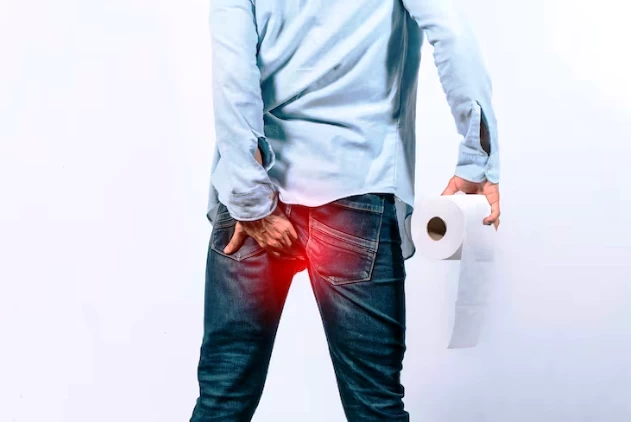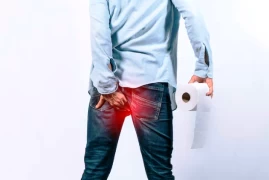
Laser Applications in the Treatment of Hemorrhoids
- Laser Applications in the Treatment of Hemorrhoids
- What is Hemorrhoid?
- What is the Role of Laser Treatment in Hemorrhoid Treatment?
- What Laser Device is Used in Laser Treatment?
- What are the Advantages of Laser Treatment?
- Are There Disadvantages of Laser Treatment?
- What Are the Stages of Laser Treatment?
- What Are the Other Hemorrhoidal Disease Treatment Methods?
- Potential Future Developments:
- In Conclusion…
In colloquial terms, hemorrhoids, also known as "basur" in Turkish, are vascular cushions in the anus area that can swell and protrude. These structures, which are normal in every person, have functions like preventing the escape of gas and fluids from the anus. Hemorrhoidal disease occurs when these vascular cushions in the anus swell due to various factors such as diarrhea, constipation, prolonged standing, and pregnancy. This condition, which is common enough to affect nearly half of people over the age of 50, can lead to discomfort in the anus, causing symptoms such as rectal bleeding, pain, discharge, and swelling.
There are many methods for treating hemorrhoidal disease, and one of them is laser therapy. In this article, I will discuss topics such as the role of laser treatments in the treatment of hemorrhoids, their advantages and disadvantages, determining suitable candidates, pre- and post-procedure care, comparisons with other treatment methods, and potential future developments.
What is Hemorrhoid?
First, let's refresh our knowledge about hemorrhoids.
Hemorrhoids are a health problem that occurs when the blood vessels in the anus area become swollen and sag. The anus is the outer opening of the rectum, and the blood vessels in this area normally prevent the escape of gas and fluid. However, due to various factors, these blood vessels can enlarge and protrude outside the anus. In this case, lump-like swellings called hemorrhoids occur.
Hemorrhoids are classified into two types: internal hemorrhoids and external hemorrhoids.
- Internal Hemorrhoids: These occur when the blood vessels inside the rectum become swollen. They usually do not cause pain and can lead to bright red bleeding during bowel movements.
- External Hemorrhoids: These occur when the blood vessels around the anus become swollen and can be seen outside the anus. External hemorrhoids are often characterized by pain, itching, and swelling.
What is the Role of Laser Treatment in Hemorrhoid Treatment?
Now let's delve into the topic of laser treatment for hemorrhoidal disease.
Laser therapy is a method used primarily in the treatment of internal hemorrhoids. The procedure involves delivering low-level laser energy to the affected tissue. Laser light helps close the blood vessels that supply blood to the hemorrhoid and causes the hemorrhoid to shrink. This treatment method is usually performed as an office-based procedure under local anesthesia.
What Laser Device is Used in Laser Treatment?
Although various types of lasers are used in the treatment of hemorrhoidal disease, the best results are achieved with the latest technological advancement, using a thin laser probe with a wavelength of 1470 nm and a power of 6 watts. This new laser device has reported success rates of 80-90% in the treatment of hemorrhoidal disease. This laser treatment for hemorrhoidal disease is called "laser hemorrhoid ablation" or "laser hemorrhoidoplasty."

What are the Advantages of Laser Treatment?
- Low Pain and Discomfort: Laser treatment can reduce pain and discomfort compared to traditional surgery because it is less invasive (causes less damage). The post-procedure recovery period is generally faster and less painful.
- Short Procedure: Laser treatment is usually quick, and patients can return home on the same day. It allows patients to return to their daily lives more quickly.
- Less Bleeding: Since there are minimal incisions in laser treatment, the risk of bleeding during and after the procedure is reduced.
Are There Disadvantages of Laser Treatment?
Laser treatment is generally more expensive compared to other treatment methods. However, the shorter treatment duration and the lack of need for hospitalization should be taken into consideration.
The effectiveness of laser treatment can vary from person to person. While hemorrhoids can completely shrink in some patients, others may experience recurrence, especially in advanced cases.
As with any surgical procedure, complications can occur in rare cases with laser treatment, such as infection or tissue damage.
What Are the Stages of Laser Treatment?
- Determining Suitable Candidates: Laser treatment can be an effective option for mild to moderate (grades 2 and 3) internal hemorrhoids. However, a careful evaluation by a general surgeon is necessary to determine suitable candidates. Factors such as the size of the patient's hemorrhoids, severity, symptoms, and overall health should be taken into account. The patient's suitability is assessed through rectoscopic procedures.
- Pre- and Post-Procedure Care: Before laser treatment, patients should be prepared for the procedure by fasting for a specific period, as instructed by the doctor. After the procedure, patients should use prescribed medications, follow hygiene rules, and avoid getting out of bed and lifting heavy objects. Taking preventive measures against constipation is especially recommended.
What Are the Other Hemorrhoidal Disease Treatment Methods?
Other common methods for the treatment of hemorrhoids include traditional surgery (hemorrhoidectomy), rubber band ligation, and sclerotherapy. Each treatment method may have its own advantages, disadvantages, and suitable candidates. Therefore, it is important to consult with a doctor to determine the most suitable treatment plan for each patient.
Potential Future Developments:
With ongoing advancements in the field of medicine, new techniques and treatment options for hemorrhoidal disease are being researched. Studies on the effectiveness of laser treatment and patient outcomes are ongoing, and it is expected that more advanced laser treatment methods will be used in the future.
In Conclusion…
Laser applications in the treatment of hemorrhoids are an effective option for suitable candidates. However, since every patient is unique, it is important to consult with a general surgeon to determine the most appropriate treatment option. The patient's symptoms, health status, and expectations should be taken into consideration when creating the most suitable treatment plan.
Stay healthy…






